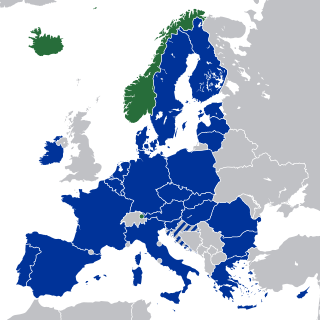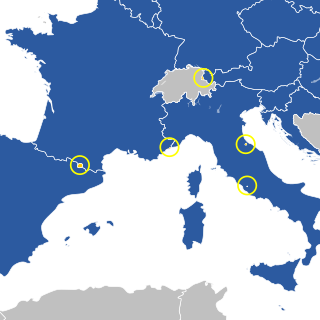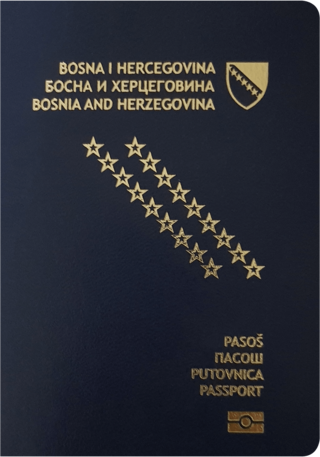Related Research Articles

The European Free Trade Association (EFTA) is a regional trade organization and free trade area consisting of four European states: Iceland, Liechtenstein, Norway and Switzerland. The organization operates in parallel with the European Union (EU), and all four member states participate in the European single market and are part of the Schengen Area. They are not, however, party to the European Union Customs Union.

The European Economic Area (EEA) was established via the Agreement on the European Economic Area, an international agreement which enables the extension of the European Union's single market to member states of the European Free Trade Association (EFTA). The EEA links the EU member states and three of the four EFTA states into an internal market governed by the same basic rules. These rules aim to enable free movement of persons, goods, services, and capital within the European single market, including the freedom to choose residence in any country within this area. The EEA was established on 1 January 1994 upon entry into force of the EEA Agreement. The contracting parties are the EU, its member states, and Iceland, Liechtenstein, and Norway. New members of EFTA would not automatically become party to the EEA Agreement, as each EFTA State decides on its own whether it applies to be party to the EEA Agreement or not. According to Article 128 of the EEA Agreement, "any European State becoming a member of the Community shall, and the Swiss Confederation or any European State becoming a member of EFTA may, apply to become a party to this Agreement. It shall address its application to the EEA Council." EFTA does not envisage political integration. It does not issue legislation, nor does it establish a customs union. Schengen is not a part of the EEA Agreement. However, all of the four EFTA States participate in Schengen and Dublin through bilateral agreements. They all apply the provisions of the relevant Acquis.

The European Union (EU) has expanded a number of times throughout its history by way of the accession of new member states to the Union. To join the EU, a state needs to fulfil economic and political conditions called the Copenhagen criteria, which require a stable democratic government that respects the rule of law, and its corresponding freedoms and institutions. According to the Maastricht Treaty, each current member state and the European Parliament must agree to any enlargement. The process of enlargement is sometimes referred to as European integration. This term is also used to refer to the intensification of co-operation between EU member states as national governments allow for the gradual harmonisation of national laws.

Eurostat is a Directorate-General of the European Commission located in the Kirchberg quarter of Luxembourg City, Luxembourg. Eurostat's main responsibilities are to provide statistical information to the institutions of the European Union (EU) and to promote the harmonisation of statistical methods across its member states and candidates for accession as well as EFTA countries. The organisations in the different countries that cooperate with Eurostat are summarised under the concept of the European Statistical System.

Currently, all of the European microstates have some form of relations with the European Union (EU).

The European Union Customs Union (EUCU), formally known as the Community Customs Union, is a customs union which consists of all the member states of the European Union (EU), Monaco, and the British Overseas Territory of Akrotiri and Dhekelia. Some detached territories of EU states do not participate in the customs union, usually as a result of their geographic separation. In addition to the EUCU, the EU is in customs unions with Andorra, San Marino and Turkey, through separate bilateral agreements.

There are currently nine states recognized as candidates for membership of the European Union: Albania, Bosnia and Herzegovina, Georgia, Moldova, Montenegro, North Macedonia, Serbia, Turkey, and Ukraine. Kosovo formally submitted its application for membership in 2022 and is considered a potential candidate by the European Union. Due to multiple factors, talks with Turkey are at an effective standstill since December 2016.

The largest enlargement of the European Union (EU), in terms of number of states and population, took place on 1 May 2004.

The 1995 enlargement of the European Union saw Austria, Finland, and Sweden accede to the European Union (EU). This was the EU's fourth enlargement and came into effect on 1 January of that year. It is also known as the EFTA Enlargement round. All these states were previous members of the European Free Trade Association (EFTA) and had traditionally been less interested in joining the EU than other European countries. Norway had negotiated to join alongside the other three, but following the signing of the treaty, membership was turned down by the Norwegian electorate in the 1994 national referendum. Switzerland also applied for membership on 26 May 1992, but withdrew it after a negative referendum result on 6 December 1992.

Relations between the European Union (EU) and the United Kingdom of Great Britain and Northern Ireland (UK) are governed, since 1 January 2021, by the EU–UK Trade and Cooperation Agreement (TCA).

Relations between the Principality of Liechtensteinand the European Union (EU) are shaped heavily by Liechtenstein's participation in the European Economic Area (EEA).

The Treaty of Accession 1972 was the international agreement which provided for the accession of Denmark, Ireland, Norway and the United Kingdom to the European Communities. Norway did not ratify the treaty after it was rejected in a referendum held in September 1972. The treaty was ratified by Denmark, Ireland and the United Kingdom who became EC member states on 1 January 1973 when the treaty entered into force. The treaty remains an integral part of the constitutional basis of the European Union.
Issues in the 2016 United Kingdom European Union membership referendum are the economic, human and political issues that were discussed during the campaign about the withdrawal of the United Kingdom from the European Union, during the period leading up to the Brexit referendum of 23 June 2016. [Issues that have arisen since then are outside the scope of this article].

Poland has been a member state of the European Union since 1 May 2004, with the Treaty of Accession 2003 signed on 16 April 2003 in Athens as the legal basis for Poland's accession to the EU. The actual process of integrating Poland into the EU began with Poland's application for membership in Athens on 8 April 1994, and then the confirmation of the application by all member states in Essen from 9–10 December 1994. Poland's integration into the European Union is a dynamic and continuously ongoing process.

The United Kingdom (UK) was a member of the European Economic Area (EEA) from 1 January 1994 to 31 December 2020, following the coming into force of the 1992 EEA Agreement. Membership of the EEA is a consequence of membership of the European Union (EU). The UK ceased to be a Contracting Party to the EEA Agreement after its withdrawal from the EU on 31 January 2020, as it was a member of the EEA by virtue of its EU membership, but retained EEA rights during the Brexit transition period, based on Article 126 of the withdrawal agreement between the EU and the UK. During the transition period, which ended on 31 December 2020, the UK and EU negotiated their future relationship.

The accession of Moldova to the European Union (EU) is on the current agenda for future enlargement of the EU.
In British politics, the "Norway-plus model" was a proposal for a post-Brexit settlement, which the British government did not pursue. Proposed in November 2018 as an alternative to the Chequers plan, it would have consisted of membership of the European Free Trade Association (EFTA) and of membership of the European Economic Area (EEA) as an EFTA member state, combined with a separate customs union with the EU to create a trade relationship similar to that between the EU and its member states today, with the exception of the political representation in the EU's bodies. Michel Barnier, the EU's Chief Negotiator, has always said that a model that combined EEA/EFTA and a customs union was one that he would be happy to consider.

Heather Grabbe is Senior Fellow at the think-tank Bruegel in Brussels, Belgium. Since 2021, she is Visiting Professor at University College London and at Katholieke Universiteit Leuven. She was previously the director of the Open Society European Policy Institute.

Passports in Europe are issued by each state individually, e.g. the Netherlands or United Kingdom. In general, passports issued in Europe either grant the holder the right of freedom of movement within the European Economic Area, to those that don't. The majority of European states are members of the European Union, and therefore issue EU passports.

Following a 2016 referendum, the United Kingdom exited from the European Union at the end of January 2020. Since leaving the EU, numerous polling organisations have conducted surveys to gauge public opinion on rejoining the organisation. The trend of the poll data shows that, over time, support for Brexit has waned, while public opinion in the UK has gradually moved in favour of rejoining the EU.
References
- 1 2 "Policy Analysis". Scottish Centre on European Relations. Retrieved 30 April 2021.
- ↑ "Press Releases". Scottish Centre on European Relations. Retrieved 1 May 2021.
- ↑ "The RSE announces 2021 Fellows". The Royal Society of Edinburgh. 30 March 2021. Retrieved 30 April 2021.
- 1 2 "Team". Scottish Centre on European Relations. Retrieved 30 April 2021.
- ↑ Hughes, Kirsty (January 2016). "Scotland and Brexit - Shockwaves will spread across EU" (PDF). Friends of Europe. Retrieved 30 April 2021.
- ↑ Murphy, Mary C; Keating, Michael; Bell, David; McEwen, Nicola; Kenny, Michael; Larner, Jac; Wincott, Dan; Hughes, Kirsty (2020). BREXIT and the Union. Centre on Constitutional Change. pp. 26–29.
- ↑ "The European Parliament, Brexit and Scotland: where do we stand?, Edinburgh - 26 October 2018". www.europarl.europa.eu. Retrieved 30 April 2021.
- ↑ "EU 'open to indy Scotland' but 'reluctant to let UK back in'". STV News. 7 July 2020. Retrieved 30 April 2021.
- ↑ "Dec 14, 2020, Online-Seminar: EU views of the UK and Scotland Post-Brexit". Foundation Office United Kingdom and Ireland. 13 December 2020. Retrieved 30 April 2021.
- 1 2 O'Neill, Michael, November 23- (2006). EU constitution. London: Routledge. ISBN 978-1-134-18337-1. OCLC 1100440908.
{{cite book}}: CS1 maint: multiple names: authors list (link) CS1 maint: numeric names: authors list (link) - 1 2 Grabbe, Heather (1998). Enlarging the EU eastwards. Kirsty Hughes. London: Royal Institute of International Affairs. ISBN 1-85567-525-0. OCLC 39116587.
- ↑ Editor, Kieran Andrews, Scottish Political. "Independent Scotland 'faces four-year fight to rejoin EU'". The Times . ISSN 0140-0460 . Retrieved 1 May 2021.
{{cite news}}:|last=has generic name (help)CS1 maint: multiple names: authors list (link) - ↑ "Analysis: Should an independent Scotland join the EEA instead of the European Union?". HeraldScotland. 20 April 2021. Retrieved 30 April 2021.
- ↑ Hughes, Dr Kirsty (26 February 2021). "The UK's European and Constitutional Challenges Collide". The Federal Trust. Retrieved 30 April 2021.
- ↑ "Would Scotland have to go to the back of the queue to join the EU?". The National. 26 March 2021. Retrieved 30 April 2021.
- ↑ Cochrane, Angus (15 July 2021). "Expert rubbishes Tory minister's 'great wall of Gretna' claim". The National. pp. 6–7.
- ↑ Nutt, Kathleen (15 July 2021). "Shock as Scotland's leading think tank on Europe to close". The National.
- ↑ Nutt, Kathleen (16 July 2021). "EU official hits out at closure of think tank". The National. p. 6.
- ↑ Nutt, Kathleen (28 November 2021). "'Let's drop old nostalgic Scots brand,' says expert". The National. p. 11. Retrieved 29 November 2021.
- ↑ European competitiveness. Kirsty Hughes, Wissenschaftszentrum Berlin. Cambridge: Cambridge University Press. 1993. ISBN 0-521-43443-2. OCLC 26014600.
{{cite book}}: CS1 maint: others (link) - ↑ Estrin, Saul; Hughes, Kirsty; Todd, Sarah (1997). Foreign direct investment in central and eastern Europe: multinationals in transition. London, UK: Royal Institute of International Affairs. ISBN 978-1-85567-481-3.
- ↑ "European Union Views of the UK post-Brexit and of the Future EU-UK Relationship". Scottish Centre on European Relations. 25 November 2020. Retrieved 30 April 2021.
- ↑ "Lessons from the EFTA Enlargement: How Would the EU Accession Process Look Today?". Scottish Centre on European Relations. 17 March 2020. Retrieved 30 April 2021.
- ↑ The Oxford handbook of Scottish politics. Michael Keating (1 ed.). Oxford, United Kingdom. 2020. ISBN 978-0-19-186377-6. OCLC 1195716917.
{{cite book}}: CS1 maint: location missing publisher (link) CS1 maint: others (link)